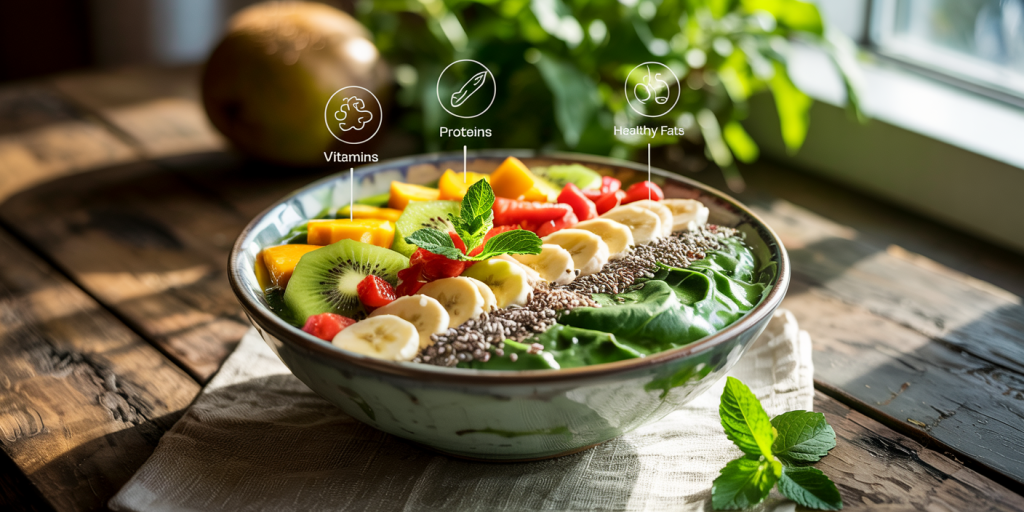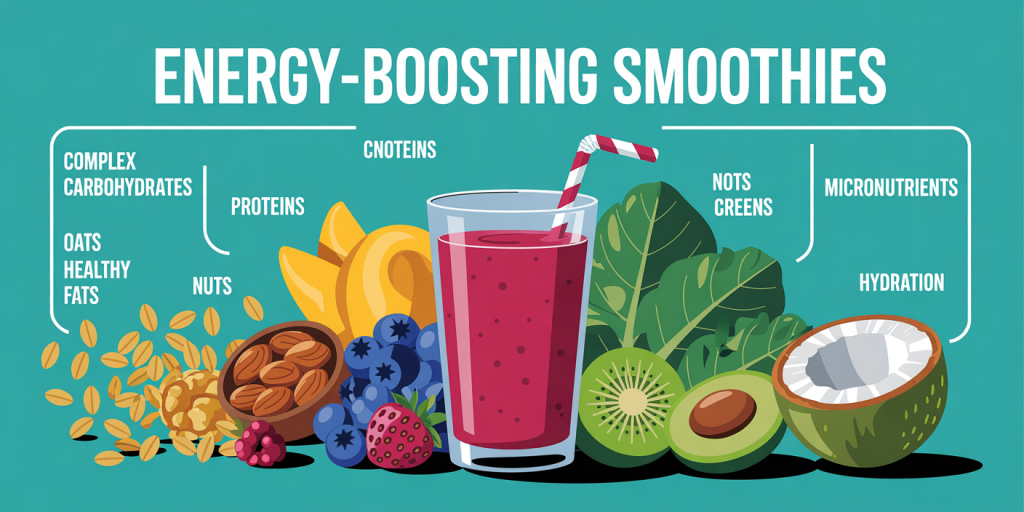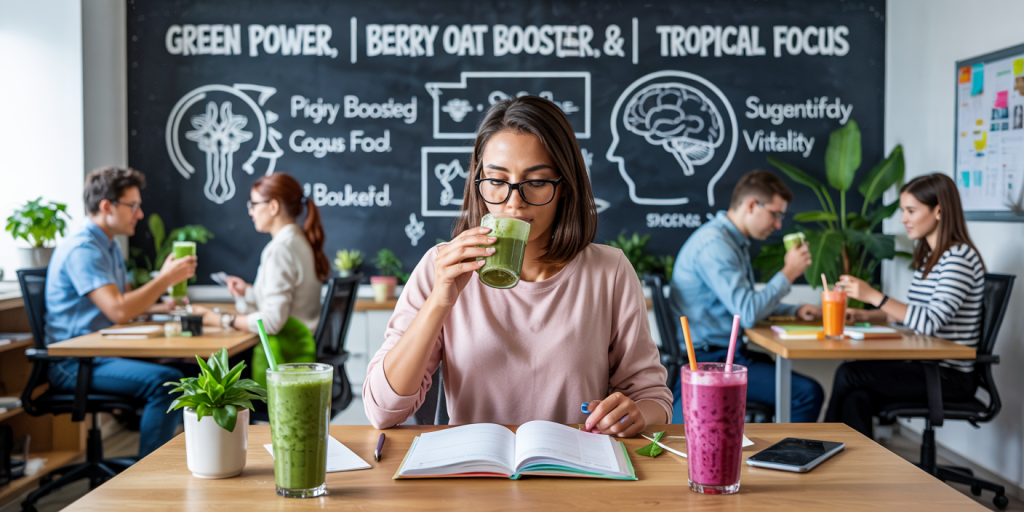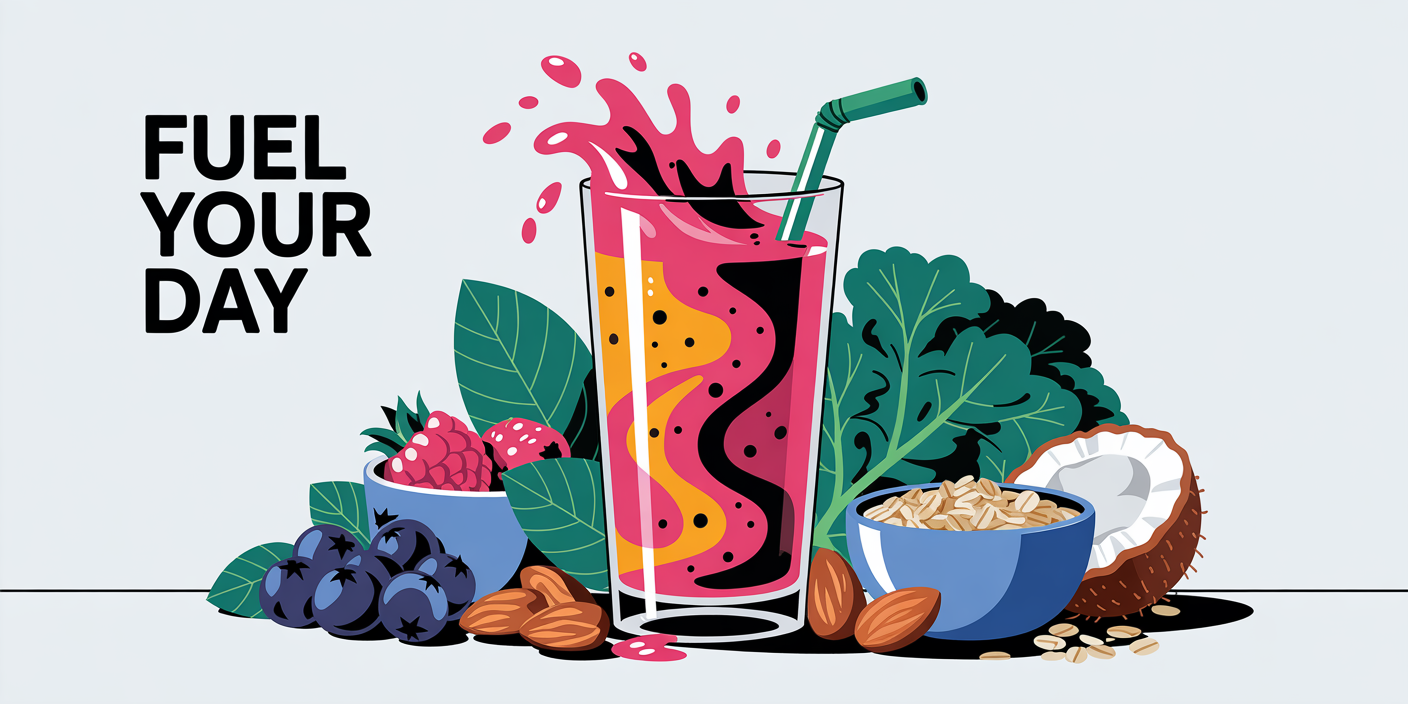In the modern fast-paced world, maintaining high levels of energy and sharp focus throughout the day can be challenging. Many people turn to caffeine, energy drinks, or processed snacks to get quick boosts, but these often result in crashes and decreased productivity. A healthier, sustainable alternative that is gaining popularity is the consumption of nutrient-rich smoothies formulated to enhance energy and cognitive function. Smoothies not only provide essential vitamins and minerals but also deliver a blend of macronutrients that support brain health and sustained vitality.

Integrating smoothies into daily routines for energy and focus merges the convenience of ready-to-consume meals with the benefits of whole foods. With diverse ingredient combinations, tailored textures, and flavors, smoothies can cater to individual preferences and nutritional needs. This article explores the science behind energy-boosting smoothies, their optimal nutrient composition, practical recipes, and their comparative advantage over traditional energy sources.

Understanding the Nutritional Basis of Energy and Focus
Energy production and cognitive acuity depend heavily on specific nutrient intake. The body and brain primarily use glucose derived from carbohydrates for fuel, but a steady supply without spikes and dips is essential. Complex carbohydrates with low glycemic indexes ensure gradual energy release, preventing the mid-morning slump frequently caused by sugary snacks.
Proteins and healthy fats also play essential roles. Amino acids from proteins serve as neurotransmitter precursors, directly influencing focus and mood. Omega-3 fatty acids, found in sources like flaxseeds and chia, improve neuronal function and cognitive resilience. Additionally, vitamins and minerals such as B-complex vitamins, magnesium, and iron are critical co-factors in metabolic and brain-related enzymatic reactions.

Scientific studies support that nutrient-dense diets positively affect mental clarity. For instance, a 2015 study published in *Nutrients* demonstrated that participants consuming balanced meals rich in micronutrients had improved sustained attention and reduced mental fatigue. Therefore, a smoothie combining carbohydrates, proteins, fats, and micronutrients is an ideal candidate for promoting both energy and focus throughout the day.
Key Ingredients for Energy-Boosting Smoothies
Creating an effective smoothie starts with selecting ingredients that contribute synergistically to energy metabolism and cognitive function. Below is an overview of the primary elements:
Complex Carbohydrates
To ensure slow glucose release, complex carb sources like oats, quinoa flakes, and sweet potatoes in smoothie form can maintain prolonged energy supply. Fruits such as berries and bananas offer natural sugars balanced with fiber to further moderate blood sugar levels.
Protein Sources
In smoothies, proteins can come from Greek yogurt, cottage cheese, plant-based protein powders (pea, hemp, brown rice), nuts, and seeds. These proteins provide necessary amino acids, including tyrosine and tryptophan, precursors to dopamine and serotonin, which influence alertness and mood regulation.
Healthy Fats
Incorporating nuts (almonds, walnuts), seeds (chia, flaxseeds), and natural oils (coconut, avocado) supplies essential fatty acids aiding in brain health, memory retention, and energy production. Fats also slow digestion for sustained nutrient release.
Micronutrient-Rich Additives
Adding leafy greens such as spinach or kale boosts iron and magnesium content, both crucial for oxygen transport and enzymatic reactions producing cellular energy (ATP). A splash of citrus juice enhances vitamin C absorption, vital for neurotransmitter synthesis.
Hydration Component
Using coconut water instead of plain water introduces electrolytes (potassium, sodium), vital for neuronal firing and muscle function, enhancing both physical and mental endurance.
Practical Smoothie Recipes to Enhance Energy and Focus
Effective recipes combine these ingredients in palatable, easy-to-make blends. Below are three examples with detailed nutritional roles:
1. Green Power Smoothie 1 cup spinach (iron, magnesium) 1 medium banana (potassium, complex carbs) 1/2 cup Greek yogurt (protein, probiotics) 1 tbsp chia seeds (omega-3, fiber) 1/2 cup coconut water (electrolytes) 1 tsp honey (natural sugar for quick energy)
This smoothie is especially beneficial for mid-morning consumption when the blood sugar dip is common. The combination aids in stabilizing glucose levels while providing protein to sustain satiety and focus.
2. Berry Oat Brain Booster 1/2 cup mixed berries (antioxidants, vitamin C) 1/4 cup oats (slow-release carbohydrates) 1 tbsp almond butter (healthy fats, protein) 1 scoop plant-based protein powder 1 cup unsweetened almond milk
Ideal for pre-lunch energy, this blend supplies antioxidants to reduce oxidative stress linked to mental fatigue and memory loss, alongside protein and complex carbs for maintained energy.
3. Tropical Focus Smoothie 1/2 cup diced mango (vitamin A and natural sugars) 1/2 cup pineapple chunks (bromelain enzymes) 1 tbsp flaxseeds (omega-3 fatty acids) 1/2 avocado (monounsaturated fats) 1 cup water or coconut water
Great for an afternoon pick-me-up, this smoothie balances natural sugars with fats and fibers that prevent sugar crashes and improve attention span during extended work sessions.
Comparative Table: Smoothies vs. Traditional Energy Sources
| Feature | Energy Smoothies | Coffee and Energy Drinks | Sugary Snacks and Bars |
|---|---|---|---|
| Nutrient Composition | Balanced macros, vitamins, minerals | Mainly caffeine, little nutrients | High sugars, low nutrients |
| Energy Release Profile | Sustained, avoids spikes | Rapid spike then crash | Quick spike with sharp crash |
| Cognitive Benefits | Supports neurotransmitter synthesis | Temporary alertness, potential jitters | Short-term energy, later fatigue |
| Impact on Mood | Enhances mood via stable blood sugar | Sometimes causes anxiety or irritability | Fluctuates with sugar levels |
| Caloric Content | Moderate, nutrient-dense | Low, with empty calories | Often high in empty calories |
| Suitability for Daily Use | Highly suitable and sustainable | Not recommended for frequent intake | Poor for regular consumption |
This table underscores why smoothies are a superior choice for those seeking sustained energy and focus without negative side effects often associated with stimulants and sugary snacks.
Real-Life Case Studies
Case Study 1: Increased Workday Productivity
Jane, a 29-year-old graphic designer, struggled with afternoon fatigue affecting her design precision. After incorporating the Green Power Smoothie into her routine at 10 a.m., she reported a 40% improvement in her ability to concentrate during afternoon tasks according to self-assessed productivity scales over eight weeks. Her self-reported mood also improved, attributed to the balanced nutrient profile replacing her previous mid-morning coffee and donut habit.
Case Study 2: Academic Performance Enhancement
A group of university students in a preliminary nutrition trial were provided with Berry Oat Brain Booster smoothies during exam weeks. Compared to their baseline dry snack habits, test scores improved by an average of 8%, with students reporting reduced exam anxiety and sustained alertness. Blood tests confirmed more stable blood glucose and reduced cortisol levels, implicating the role of balanced nutrition in cognitive performance.
Scientific Research Supporting Smoothies for Cognitive and Energy Benefits
Multiple research efforts highlight the connection between nutrition and mental performance. A 2018 review in *Frontiers in Nutrition* emphasized the positive outcomes of omega-3 fatty acid intake combined with complex carbohydrates for attention and memory enhancement. Similarly, intermittent consumption of polyphenol-rich fruits (such as berries) has been associated with better executive functioning and delayed cognitive decline.
Furthermore, the synergy between macronutrients and micronutrients in smoothies allows optimized nutrient absorption, essential for efficient ATP production and neurotransmitter activity. According to the *Journal of Sports Sciences* in 2020, athletes consuming smoothie-based recovery drinks showed enhanced cognitive reaction times and reduced mental fatigue.
Future Perspectives: The Role of Functional Smoothies in Holistic Wellness
Looking ahead, the integration of functional ingredients—such as adaptogens (ashwagandha, rhodiola), nootropics (bacopa, ginseng), and probiotics—into smoothies may further enhance their energy and focus benefits. Personalized nutrition leveraging genetic and microbiome profiles could tailor smoothie recipes to individuals’ unique metabolic and cognitive needs, maximizing outcomes.
Technology advancements in wearable devices measuring real-time cognitive metrics could allow dynamic adjustment of smoothie ingredients aligned with daily energy demands. Moreover, the sustainability movement propels innovations in plant-based proteins and superfood cultivation, enabling more nutrient-dense and eco-friendly options.
In workplaces and educational settings, smoothie bars delivering customized blends might become common, replacing traditional vending options, ultimately fostering healthier, more productive environments. Continued research into the microbiota-gut-brain axis may also shed light on how smoothie ingredients affect mental health and circadian rhythms, expanding their therapeutic potential.
By embracing smoothies that capitalize on whole-food nutrition, society stands to benefit from improved physical energy, cognitive performance, and long-term wellness outcomes. The simplicity, versatility, and scientific backing make smoothies for energy and focus an appealing cornerstone of modern nutritional strategies.

Deixe um comentário